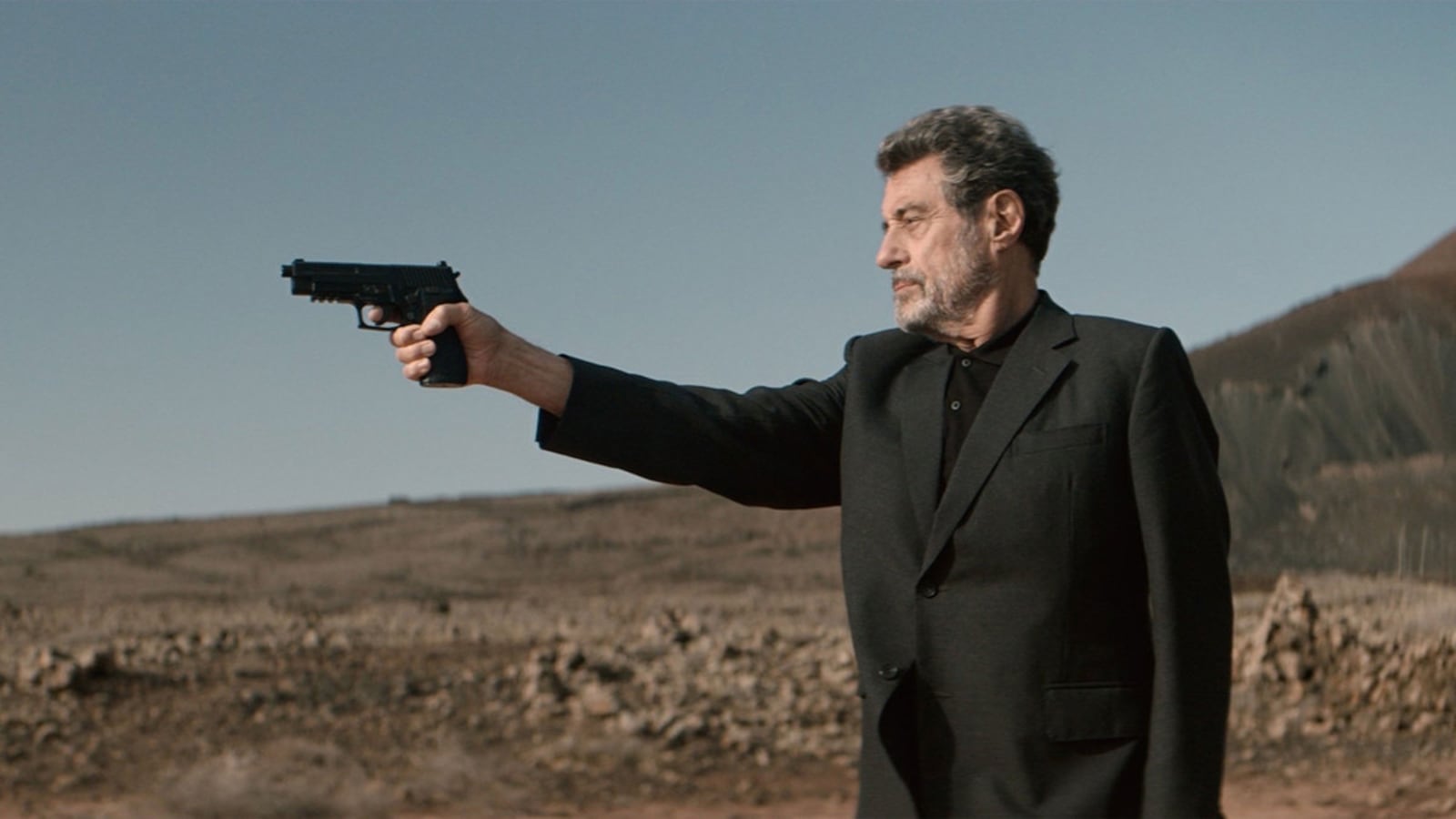As highlighted by his work in Deadwood, Sexy Beast, and John Wick (to name just three), Ian McShane is as cool and intimidating as they come, and he puts those qualities to expert use in American Star, a stripped-down thriller that affords its headliner the opportunity to exude menace, remorse, and longing through quiet restraint. Gonzalo López-Gallego’s film is a relatively dialogue-light affair that hinges on the magnetic presence of its star, and McShane more than delivers, conveying so much with his eyes, his face, and his body language that he gives a virtual masterclass in telling by showing. As a hitman on an assignment in a far-flung locale, he’s as good as he’s ever been, exuding a heft and danger that typifies this understated and affecting genre effort.
American Star (in theaters and VOD on Jan. 26) spends its first 30 minutes or so simply following Wilson (McShane) as he goes about his solitary business. Arriving on the Spanish island of Fuerteventura, he picks up his rental car and drives out to an isolated spot where he locates, in his trunk, a gun and an envelope with two pictures, one of a man and the other of a house with an alarm code.
He travels to this residence, which sits in the middle of a vast desert, and patiently checks out its clean, well-decorated interior. Cloaked in a trademark black suit (sans tie) and with a neatly trimmed beard that’s more salt than pepper, Wilson looks like he fits in this home, given that he’s nothing if not poised and polished. The film is likewise, as director López-Gallego shoots with a meticulousness that never feels rushed or showy, his panoramas of this windswept Atlantic outpost and his snapshots of McShane (initially from a distance, through slatted walls or out of focus) proving serene and striking.
Wilson’s inspection of this house is interrupted by the appearance of an unknown woman on a motorcycle, which compels him to sneak away and head to a swanky hotel where he plans to lay low until his mission’s target arrives. López-Gallego and writer Nacho Faerna express character through action, as when Wilson gives two glances (the second more disgusted than the first) at an ugly painting hanging above his bed, prompting him to set it outside his room. Also in the hallway is Max (Oscar Coleman), a young boy whose parents can sometimes be heard screaming behind closed doors, and Wilson initiates a casual friendship with the kid. Otherwise, he sits at a bar where a duo performs a soulful rendition of Europe’s “The Final Countdown,” lounges in a hot tub in his sunglasses, and strolls about this remote milieu, filled with laid-back tourists and even more relaxed locals.

Ian McShane and Fanny Ardant in American Star
IFC FilmsAs Wilson goes about his calm days and nights, a cigarette often between his lips, American Star lays the groundwork for its forthcoming tale. However, what’s so inviting about the film is that it’s content to keep incident to a minimum in favor of hanging out in McShane’s charismatic company. One evening, he’s directed to a local music club where he discovers the previously spied motorbike and, behind the bar, the woman. This stranger will eventually be identified as Gloria (Nora Arnezeder), although at this early point in the proceedings, Wilson barely engages with her other than to hear about a nearby derelict ship called the American Star. At the end of the night, she says goodbye and zooms off as he stands on the street corner enjoying a private smoke, radiating the sort of nonchalant badass confidence and sexiness for which the movies were made.
Wilson moves with unrushed purpose but he’s not on holiday, and after failing to visit the American Star, he’s approached by Ryan (Adam Nagaitis), the son of Wilson’s former Falklands War comrade, whose friendliness can’t mask the fact that he’s there to keep tabs on the assassin. There’s tension beneath their joviality, and their meeting provides American Star with its first real flickers of suspense. For long stretches, however, López-Gallego places his focus squarely on McShane’s Wilson, whom we learn about less through snippets of dialogue than via the way he buttons his coat when he steps out of his car, or chews his food, or surveys his surroundings. Wilson is a lone wolf who’d never describe himself in such clichéd terms, and the actor beautifully suggests past horrors, misdeeds, and the regrets that come with both through his weary visage and focused comportment. He’s a cinematic archetype—the alienated, melancholy, ruthless professional killer—whom McShane imbues with mysterious depth.

Adam Nagaitis in American Star
IFC FilmsAmerican Star has a story to tell yet for most of its runtime it’s primarily about a mood, a feeling, embodied by its protagonist—some sort of sad mixture of guilt, loneliness, self-disgust, and resignation. McShane is so great here that it’s almost a shame when the narrative inevitably begins taking precedence, although even in its later passages, the director maintains his placid atmosphere, going light on his central metaphor (i.e., Wilson and the real-life American Star are kindred aging, keeling relics) and gently developing Wilson’s growing relationship with Max and Gloria (and her mother, played by Fanny Ardant). The film’s third-act bombshells are revealed not as blaring punctuations but as morose twists of fate, and they come equipped with a romantic noir fatalism that creeps under the skin.
The closer Wilson gets to those around him, the more he puts them (and himself) in jeopardy, since attachments, much less love, aren’t compatible with the mercenary life he’s chosen. American Star knows it’s trading in familiar conventions and yet it does so with a composure and agility that makes them resonate as, if not new, then at least alive. López-Gallego’s latest won’t shake the world; it’s a genre film with only modest ambitions. Nonetheless, its sureness of tone and temperament far outpaces most likeminded modern ventures, and in McShane, it boasts a lead performance that any bigger-budgeted movie would die for—and which once again confirms that, no matter the setting or scenario, he’s an actor of peerless cool.






